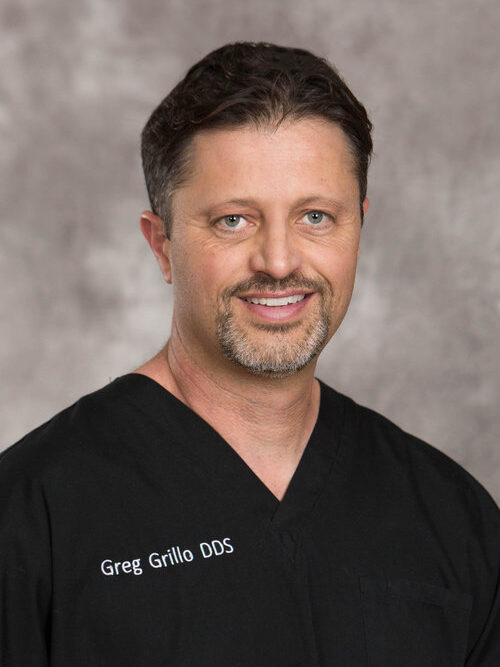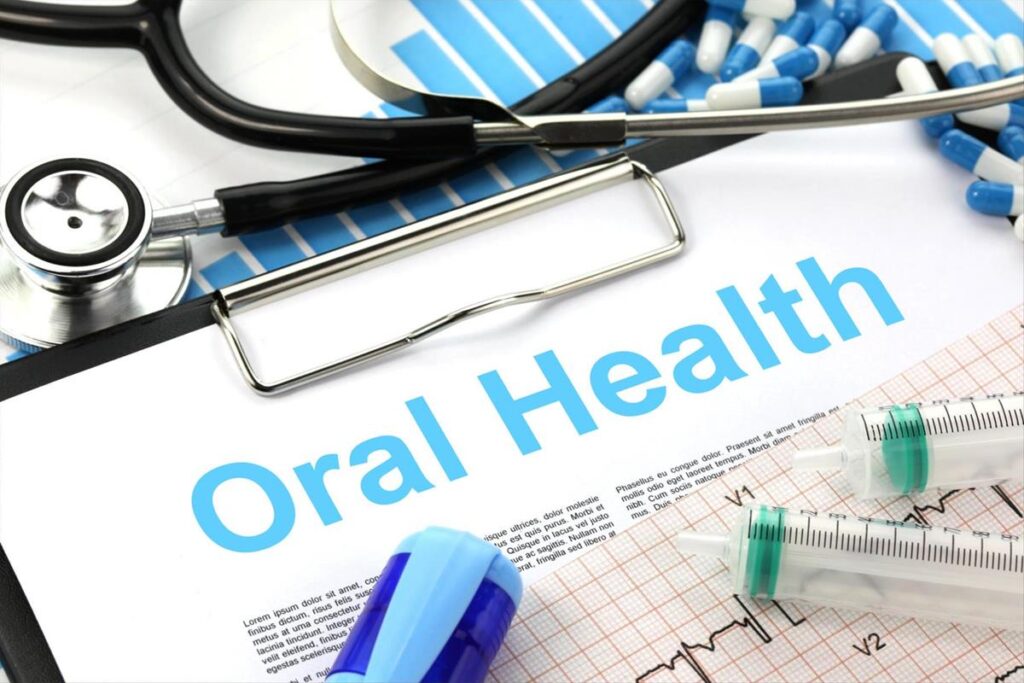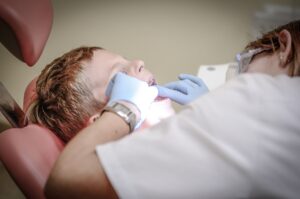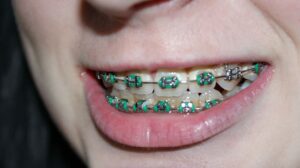The COVID-19 pandemic has led to delays in dental care for many people. Non-emergency dentistry has been curtailed and people are not sure whether they should go to the dentist or not. But the COVID pandemic has also provided an opportunity to renew interest in oral health. Today, we’re answering some common questions about COVID and dental health.
Is it safe to go see a dentist during the COVID-19 pandemic?
Going to see a dentist during the COVID-19 pandemic can potentially pose some risks. Dentists work in the mouth area and must be in close proximity to a patient’s mouth and nose. This is unavoidable during dental treatment. Therefore, there is a risk of virus transmission from the patient to the dental professional or the other way around.
Most dental offices have reopened and are following enhanced hygiene protocols to minimize the risks associated with COVID and dental health.
If you are at high risk of COVID and do not need emergency dental care, it might be a good idea to check if your dentist is offering telemedicine or online consultations. Web cams and smart phones have made it possible for dentists to see vulnerable patients in the safety of their homes.
If you do need to get in to a dental office, follow all the recommended COVID protocols, such as wearing a mask and washing your hands frequently. Do not make a dental appointment if you have recently been in contact with a person who has tested positive for COVID-19 or if you yourself are positive or have symptoms that could be COVID.
Is there a link between COVID and dental health?
The COVID-19 disease caused by a coronavirus is a respiratory infection. There is no direct link between COVID and dental health. However, COVID can have indirect effects on oral health.
Experts stay that some oral conditions may be aggravated by COVID-19, especially autoimmune dental conditions that are linked to a compromised immune system. Also, multi-drug treatment in people with severe COVID can potentially aggravate some oral conditions.
Side effects of medications used for the treatment of COVID-19 may cause dental/oral problems such as reduced saliva production or changes in oral sensation even after full recovery from COVID. For example, the antiviral drugs lopinavir and ritonavir may be prescribed to reduce viral load and death rates from COVID. These medications can cause dry mouth, mouth ulcers, and stomatitis as side effects.
Severe COVID infection and its treatment may contribute to negative oral health by increasing the risk of xerostomia (dry mouth) and opportunistic fungal infections (oral thrush) due to decreased saliva production. It can also cause gingivitis (gum inflammation) and mouth ulcers due to compromised immunity.
Another possible link between COVID and dental health is that life-saving therapies like external ventilators that are used in severely ill, hospitalized patients may lead to a deterioration in oral health.
Does poor oral health lead to more severe COVID?
Studies have found that people with a poor baseline oral health status may be at risk of more severe COVID compared to those with good oral health. This is because both COVID severity and poor oral hygiene are linked to hyper-inflammation. Indeed, studies have shown a relationship between C-reactive protein (CRP) values and oral health. CRP is an inflammatory blood marker that is increased in people who are severely ill with COVID. High CRP is linked to worse outcomes in COVID patients. People with poor oral health tend to have higher CRP values.
A new study has found another link between COVID and dental health. It showed that people with periodontitis (gum disease) are more likely to suffer from severe COVID-19 infections with complications like ICU admission, assisted ventilation, and death.
How has COVID impacted children’s oral health?
Surveys have shown that the COVID-19 pandemic has negatively impacted oral health in children. This is due to various reasons such as increased eating and drinking between meals while at home, reduced frequency of brushing, and delays in seeking routine dental care.
There are also reports of an increase in oral problems like TMJ (temporomandibular joint) and aphthous stomatitis (mouth ulcers) due to increased stress.
If your child is showing signs and symptoms of poor oral health during COVID, consider seeing a pediatric dentist in your area (Express Dentist can help you find one).
What can I do to maximize my oral health during the COVID pandemic?
Dentists recommend that you practice good oral hygiene to keep your teeth and gums healthy. This can help to prevent diseases in general, including viral infections like COVID. Here are some tips on COVID and dental health:
- Wash your hands before and after brushing and flossing your teeth
- Brush your teeth at least twice a day and don’t forget to clean your tongue
- Use interdental devices like floss to clean between your teeth
- Consider adding a mouthwash to brushing and flossing for enhanced oral hygiene
- If you wear dentures or oral appliances, clean them every day
- Never share your toothbrush with others
- Store your toothbrush in a clean container and allow it to air dry
- Make sure your toothbrush does not touch other toothbrushes belonging to family members
- Replace your old toothbrush with a new one immediately after you’ve been sick or recovered from COVID
- Make sure you’re alone in the bathroom when brushing
- Wipe the sink and tap with disinfectant wipes after use
- Stay well hydrated
As you can see, there are many indirect links between COVID and dental health. If, like many people, you’ve fallen behind on dental care during the COVID-19 pandemic, now is the time to get up-to-date.
Express Dentist has a trusted network of experienced dental professionals across the country. We can connect you to an experienced dentist for routine dental care or specific treatment for an oral health condition. Call Express Dentist today and make sure your dental health is optimum during COVID.
About the author

Dr. Greg Grillo
Dr. Greg Grillo DDS studied at the University of Washington where he received a bachelors degree with Honors and later attended dental school on the same campus. Following school Dr. Greg served in the United States Navy as a dental officer. During this time he received advanced training in specialty areas of dentistry while also treating families of members of the military.
As well as sharing valuable information on dentistry and oral health, Dr. Greg remains a practicing dentist to this day. He works with families in the Okanogan Valley where he lives with his wife and three children.
- Dr. Greg Grillo
- Dr. Greg Grillo
- Dr. Greg Grillo
- Dr. Greg Grillo
- Dr. Greg Grillo
- Dr. Greg Grillo
- Dr. Greg Grillo
- Dr. Greg Grillo
- Dr. Greg Grillo
- Dr. Greg Grillo
- Dr. Greg Grillo
- Dr. Greg Grillo
- Dr. Greg Grillo
- Dr. Greg Grillo
- Dr. Greg Grillo
- Dr. Greg Grillo
- Dr. Greg Grillo
- Dr. Greg Grillo
- Dr. Greg Grillo
- Dr. Greg Grillo
- Dr. Greg Grillo
- Dr. Greg Grillo
- Dr. Greg Grillo
- Dr. Greg Grillo
- Dr. Greg Grillo
- Dr. Greg Grillo
- Dr. Greg Grillo
- Dr. Greg Grillo
- Dr. Greg Grillo
- Dr. Greg Grillo
- Dr. Greg Grillo
- Dr. Greg Grillo
- Dr. Greg Grillo
- Dr. Greg Grillo
- Dr. Greg Grillo
- Dr. Greg Grillo
- Dr. Greg Grillo
- Dr. Greg Grillo
- Dr. Greg Grillo
- Dr. Greg Grillo
- Dr. Greg Grillo
- Dr. Greg Grillo
- Dr. Greg Grillo
- Dr. Greg Grillo
- Dr. Greg Grillo
- Dr. Greg Grillo
- Dr. Greg Grillo
- Dr. Greg Grillo
- Dr. Greg Grillo
- Dr. Greg Grillo
- Dr. Greg Grillo
- Dr. Greg Grillo
- Dr. Greg Grillo
- Dr. Greg Grillo
- Dr. Greg Grillo
- Dr. Greg Grillo
- Dr. Greg Grillo
- Dr. Greg Grillo
- Dr. Greg Grillo
- Dr. Greg Grillo
- Dr. Greg Grillo
- Dr. Greg Grillo
- Dr. Greg Grillo
- Dr. Greg Grillo
- Dr. Greg Grillo
- Dr. Greg Grillo
- Dr. Greg Grillo
- Dr. Greg Grillo
- Dr. Greg Grillo
- Dr. Greg Grillo
- Dr. Greg Grillo
- Dr. Greg Grillo
- Dr. Greg Grillo
- Dr. Greg Grillo
- Dr. Greg Grillo
- Dr. Greg Grillo
- Dr. Greg Grillo
- Dr. Greg Grillo
- Dr. Greg Grillo
- Dr. Greg Grillo
- Dr. Greg Grillo
- Dr. Greg Grillo
- Dr. Greg Grillo
- Dr. Greg Grillo
- Dr. Greg Grillo
- Dr. Greg Grillo
- Dr. Greg Grillo
- Dr. Greg Grillo
- Dr. Greg Grillo
- Dr. Greg Grillo
- Dr. Greg Grillo




